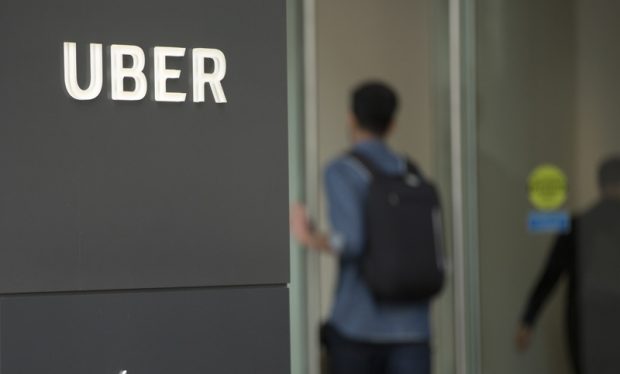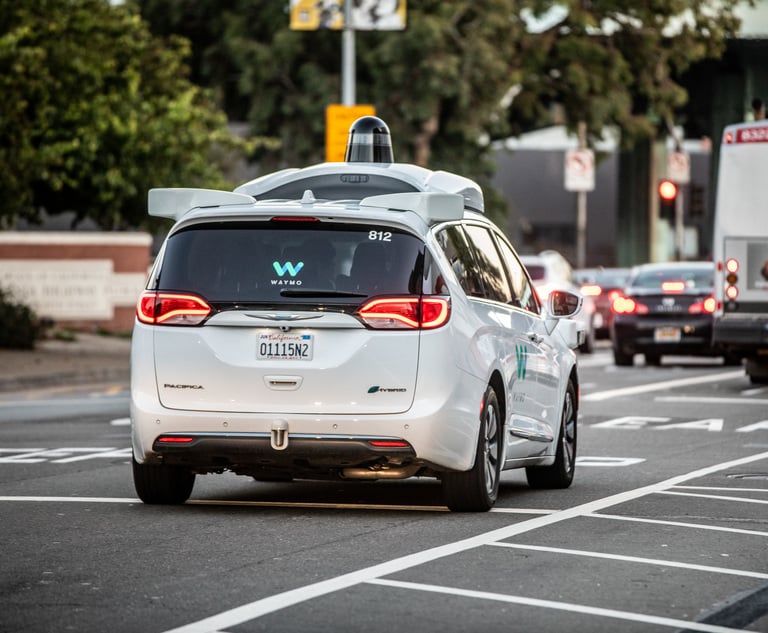Quinn Emanuel, Sidecar Call Uber 'Monopolist' in New Lawsuit
The successor to defunct ridesharing company Sidecar claims Uber lowered prices to eliminate competition from the market.
December 11, 2018 at 06:46 PM
3 minute read
 Uber, 1455 Market Street in San Francisco. (Photo: Jason Doiy/ALM)
Uber, 1455 Market Street in San Francisco. (Photo: Jason Doiy/ALM)
The successor company to defunct ride-hailing app Sidecar sued Uber Technologies Inc. on Tuesday alleging Uber used unfair tactics to drive competition off the road and is “now a monopolist.”
The suit filed by SC Innovations Inc. in the U.S. District Court for the Northern District of California claims Uber stole Sidecar's business model and “intentionally sustained near-term losses that were designed to drive Sidecar out of the market while Uber acquired a dominant market position.”
In a statement, Uber denied the allegations and said Sidecar's suit got ”it backwards” when it called the company's low prices anticompetitive.
“Ridesharing is a highly competitive industry, with many players coming and going over the years—like Sidecar, not all have survived,” an Uber spokesperson said in a statement.
Ethan Glass and Claude Stern of Quinn Emanuel Urquhart & Sullivan are representing SC Innovations.
“We fought hard in the marketplace, and were the first company to introduce a number of cutting-edge features that are now a part of every ride-hailing app,” Sidecar founder Sunil Paul said in a blog post Tuesday. “If Uber had won the ride-hailing market on a level playing field, we would have been disappointed, but that's something we could have lived with. That's not what happened.”
Sidecar launched its ridesharing app in 2012, three years after Uber's debut in 2009. But Sidecar allowed drivers to use their personal vehicles and pick up passengers traveling similar routes in one ride. Uber launched a similar service, Uber X, in 2013.
Sidecar alleges Uber subsidized driver pay and rider fare, operating at a loss, as executives “specifically planned for this subsidized pricing strategy to foreclose competition.”
“In plain English, it means Uber subsidized rides and driver payments to drive Sidecar and competitors out of the market, so they could raise prices later,” Paul said. “And it looks like their plan worked. We shut down in December 2015 and ever since Uber has been raising prices for passengers and lowering payments to drivers.”
It's not the first time Uber's been sued by the competition or litigated against Quinn Emanuel attorneys. In February, Uber settled a high-profile trade secrets case brought by Google's autonomous vehicle branch Waymo, which claimed Uber poached a star engineer for his access to Google's self-driving vehicle technology. Waymo was represented by a Quinn team in that litigation.
The latest suit comes at a busy time for Uber. Less than a week ago, the company filed to go public—around the time that competitor Lyft, Inc. did the same.
“We believe the timing of this complaint, filed three years after Sidecar went out of business, is not a coincidence,” Uber's spokesperson said.
Read the complaint:
Read more:
'Calling Uber on Their Bluff,' Plaintiffs Lawyers Strike Back to Compel Arbitration
Uber and Former Employees Trade Jabs in New Suit That Hearkens Back to 'Waymo v Uber'
This content has been archived. It is available through our partners, LexisNexis® and Bloomberg Law.
To view this content, please continue to their sites.
Not a Lexis Subscriber?
Subscribe Now
Not a Bloomberg Law Subscriber?
Subscribe Now
NOT FOR REPRINT
© 2025 ALM Global, LLC, All Rights Reserved. Request academic re-use from www.copyright.com. All other uses, submit a request to [email protected]. For more information visit Asset & Logo Licensing.
You Might Like
View All

Shareholder Democracy? The Chatter Musk’s Tesla Pay Case Is Spurring Between Lawyers and Clients
6 minute read
Willkie Farr & Gallagher Drives Legal Challenge for Uber Against State's Rideshare Laws
5 minute read
Trending Stories
- 1Uber Files RICO Suit Against Plaintiff-Side Firms Alleging Fraudulent Injury Claims
- 2The Law Firm Disrupted: Scrutinizing the Elephant More Than the Mouse
- 3Inherent Diminished Value Damages Unavailable to 3rd-Party Claimants, Court Says
- 4Pa. Defense Firm Sued by Client Over Ex-Eagles Player's $43.5M Med Mal Win
- 5Losses Mount at Morris Manning, but Departing Ex-Chair Stays Bullish About His Old Firm's Future
Who Got The Work
J. Brugh Lower of Gibbons has entered an appearance for industrial equipment supplier Devco Corporation in a pending trademark infringement lawsuit. The suit, accusing the defendant of selling knock-off Graco products, was filed Dec. 18 in New Jersey District Court by Rivkin Radler on behalf of Graco Inc. and Graco Minnesota. The case, assigned to U.S. District Judge Zahid N. Quraishi, is 3:24-cv-11294, Graco Inc. et al v. Devco Corporation.
Who Got The Work
Rebecca Maller-Stein and Kent A. Yalowitz of Arnold & Porter Kaye Scholer have entered their appearances for Hanaco Venture Capital and its executives, Lior Prosor and David Frankel, in a pending securities lawsuit. The action, filed on Dec. 24 in New York Southern District Court by Zell, Aron & Co. on behalf of Goldeneye Advisors, accuses the defendants of negligently and fraudulently managing the plaintiff's $1 million investment. The case, assigned to U.S. District Judge Vernon S. Broderick, is 1:24-cv-09918, Goldeneye Advisors, LLC v. Hanaco Venture Capital, Ltd. et al.
Who Got The Work
Attorneys from A&O Shearman has stepped in as defense counsel for Toronto-Dominion Bank and other defendants in a pending securities class action. The suit, filed Dec. 11 in New York Southern District Court by Bleichmar Fonti & Auld, accuses the defendants of concealing the bank's 'pervasive' deficiencies in regards to its compliance with the Bank Secrecy Act and the quality of its anti-money laundering controls. The case, assigned to U.S. District Judge Arun Subramanian, is 1:24-cv-09445, Gonzalez v. The Toronto-Dominion Bank et al.
Who Got The Work
Crown Castle International, a Pennsylvania company providing shared communications infrastructure, has turned to Luke D. Wolf of Gordon Rees Scully Mansukhani to fend off a pending breach-of-contract lawsuit. The court action, filed Nov. 25 in Michigan Eastern District Court by Hooper Hathaway PC on behalf of The Town Residences LLC, accuses Crown Castle of failing to transfer approximately $30,000 in utility payments from T-Mobile in breach of a roof-top lease and assignment agreement. The case, assigned to U.S. District Judge Susan K. Declercq, is 2:24-cv-13131, The Town Residences LLC v. T-Mobile US, Inc. et al.
Who Got The Work
Wilfred P. Coronato and Daniel M. Schwartz of McCarter & English have stepped in as defense counsel to Electrolux Home Products Inc. in a pending product liability lawsuit. The court action, filed Nov. 26 in New York Eastern District Court by Poulos Lopiccolo PC and Nagel Rice LLP on behalf of David Stern, alleges that the defendant's refrigerators’ drawers and shelving repeatedly break and fall apart within months after purchase. The case, assigned to U.S. District Judge Joan M. Azrack, is 2:24-cv-08204, Stern v. Electrolux Home Products, Inc.
Featured Firms
Law Offices of Gary Martin Hays & Associates, P.C.
(470) 294-1674
Law Offices of Mark E. Salomone
(857) 444-6468
Smith & Hassler
(713) 739-1250






